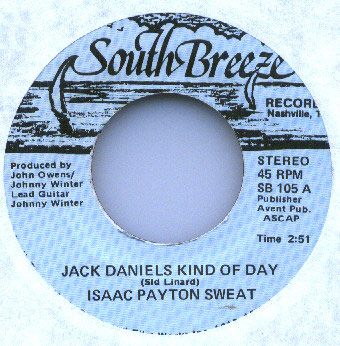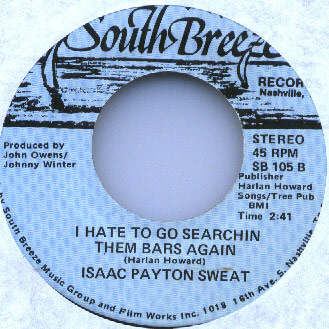Isaac Payton Sweat: The King of Cotton-Eyed Joe and a Texas Music Pioneer
-
Isaac Payton Sweat (born: 19 July 1944) was Johnny's bass player in the '60's (Black Plague Band) and occasionally during the '70's and '80's. He enjoyed a regional solo country career of his own; having a minor hit with his version of the Cotton-eyed Joe. He performed regularly in Southeast Texas up until his death on 23-Jun-1990 .
Isaac Payton Sweat was born in Port Arthur, Texas in 1945 and moved to nearby Nederland (Colorado) at a young age. His father and uncles played in bands such as "The Fruit Jar Drinkers" and "Firestone Boys". They played "hoedowns" where someone would pick up a fiddle, and another a guitar and soon they would all be playing a Louisiana backwoods hoedown tune. "Ikey's (as Isaac was called) father was a professional musician and traveled the road playing dance halls, but none much farther than 100 miles away.
Ikey played the banjo at age 13 and then played the guitar in several high school rock bands. Although he learned to read music he always played by ear. During that time Country Music was not so popular with high school kids and most bands played rock.
THE CONTINENTALS AND COASTALEERS
He played in a group called The Continentals where he made eight dollars a night, but they only lasted a year. He then enrolled in Lamar University's pre-med school and minored in music but playing at night and attending school in the day was too much and he dropped out after only a couple of months.
Nationally renoun blues guitarist Johnny Winter and Ikey had attended differenct high schools but had known each other through their band activities and at Lamar College. Ikey joined Winter's band, The Crystaliers and later named The Coastaleers. They had a number 1 regional hit called "Eternally". The band toured for three years traveling in an ever widening radius which eventually went as far as Georgia.
Ikey played bass on the Johnny Winter's Columbia Record release "White, Hot & Blue" , a very successful album. Then he went "psychedelic" in the days of blacklights, posters, and long hair. Those days found musicians jumping from band to band without much loyalty or fear of unemployment. When he switched to country music he considered himself the original country "outlaw" when he had the beard and Willie Nelson was still in Nashville with a military haircut. Sweat cut his hair and began playing conservative country. In 1981 he had his own band, but preferred to be a singer and not a leader.
MR "COTTON EYED JOE" Sweat cut a vocal version of the Al Dean instrumental standard "Cotton Eyed Joe" which became a big regional hit. In 1980 everyone was doing "The Cotton Eyed Joe". Isaac WAS "Mr. COTTON EYED JOE".
Ikey did not like, or understand the business side of the record industry and felt that he didn't get what he deserved from his best selling recording. However, it was said that he had recorded the song for a flat fee and no royalties were due. Without a valid contract he was free to re-record the song for PAID RECORDS in 1981. When he got his first royalty check from PAID RECORDS he said that out of all the recordings he had made, that was the first time he had ever received any royalties.
Ikey became disgusted with local radio for as hard as he tried, he could not get them to play any record of his since "Cotton Eyed Joe". Most stations at that time had quit playing local records and were only playing national hits. Ikey probably achieved opposite of the desired results with local radio personnel.
He went from manager to manager. He seemed to quit the good ones too quickly and stay with the bad ones too long.
Ikey was working steady and had gone to Nashville where he recorded 'A Redneck Is the Backbone of America", for which he had high hopes, and three other songs for Telstar Records, the last of which was "THE DAY THE MUSIC DIED".
"THE DAY THE MUSIC DIED"
He was found dead of a contact gunshot wound June 23, 1990. Ikey's wife found his body in the garage of his Richmond, Texas home, a 25 caliber automatic pistol, keys and sunglasses were on the floor near his left hand at 1:30 A.M. Ikey was right handed. He had just returned from a performance in a Houston area club.
The justice of the Peace said the findings did not back up the theory of suicide. No traces of gunpowder was found on either hand. The circumstances surrounding his death are still not resolved.
ISAAC PAYTON SWEAT had enough success to feel fame was within his grasp which must make any performer frustrated. He did achieve fame with an old folk song done many times before and kept alive by Al Dean until Ikey could write lyrics and create a new hit. Thirteen years later it is still selling and people are still dancing to Ikey's "Cotton Eyed Joe". Rest well Ikey.
Isaac Payton Sweat – "Jack Daniels Kind of Day" (7" Vinyl Single)
Released on South Breeze Records, the single "Jack Daniels Kind of Day" stands as a quintessential example of Isaac Payton Sweat's dynamic contribution to Texas country music. Recorded in Nashville, Tennessee, this track captures the rugged, honky-tonk spirit that Sweat was known for, blending traditional country with a modern edge.
The production, helmed by John Owens and legendary blues guitarist Johnny Winter, adds a unique texture to the recording. Winter's involvement is particularly noteworthy, as he not only co-produced the track but also provided the lead guitar work. His signature fiery style lends a bluesy depth to Sweat’s country sound, creating an engaging fusion of genres. The interplay between Sweat's unmistakable vocals and Winter's raw guitar creates a sound that is both grounded in honky-tonk tradition and elevated by rock-infused energy.
"Jack Daniels Kind of Day" is emblematic of Sweat's ability to tell stories through music, with lyrics reflecting the working-class ethos of resilience and grit. Released at a time when country music was undergoing a revival, this single represents a distinctive blend of Texas dancehall culture and Nashville’s polished production.
Listen to Jack Daniels Kind of Day
Jack Daniels Kind of Day

I Hate To Go Searchin Them Bars Again
